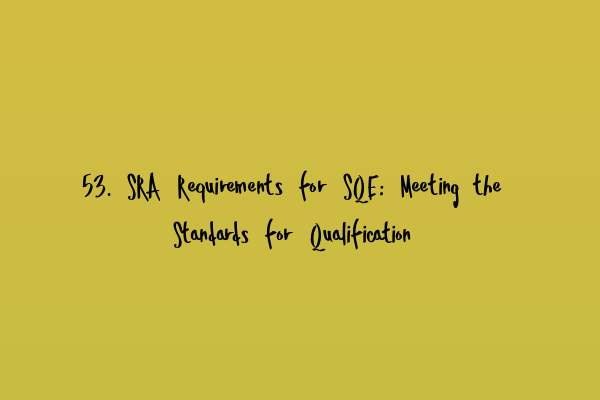SRA Requirements for SQE: Meeting the Standards for Qualification
Aspiring solicitors in the UK have long followed the traditional path of completing a law degree, followed by the Legal Practice Course (LPC) or the Graduate Diploma in Law (GDL), before commencing a training contract. However, with the introduction of the Solicitors Qualifying Examination (SQE), there are now alternative pathways to qualification. In this blog post, we will explore the SRA requirements for SQE and how aspiring solicitors can meet the standards for qualification.
Understanding the SQE
The SQE was introduced by the Solicitors Regulation Authority (SRA) as a new system for qualifying solicitors in England and Wales. It aims to provide a more consistent and fair assessment process for all candidates, regardless of their educational background. The SQE is divided into two stages: SQE1 and SQE2.
SQE1 assesses candidates’ functioning legal knowledge through multiple-choice questions (MCQs) and written questions, while SQE2 tests their practical legal skills through scenario-based questions and written tasks.
In order to meet the SRA requirements for SQE, candidates must demonstrate their competence in the following areas:
- Legal knowledge and understanding
- Legal research and analysis
- Legal writing and drafting
- Client interviewing and advising
- Advocacy and oral presentation
- Case and matter analysis
Preparation for the SQE
In order to meet the standards for qualification in the SQE, candidates need to invest time and effort into thorough preparation. Here are some strategies that can help aspiring solicitors succeed in the SQE:
Mastering Time Management
Time management is a crucial skill for success in the SQE. With the demand of answering a large number of questions within a limited timeframe, candidates need to be able to effectively manage their time. Strategies such as prioritizing questions, practicing under timed conditions, and utilizing mnemonic devices can help improve time management skills. For more tips on mastering time management, check out our article on Mastering Time Management in SQE: Strategies for Efficient Exam Completion.
Conquering Multiple Choice Questions (MCQ) in SQE1
SQE1 includes a significant portion of MCQs, and mastering this question format is crucial. Understanding techniques such as process of elimination, identifying keywords, and practicing with mock tests can greatly improve performance in the MCQ section. For more detailed strategies on tackling MCQs in SQE1, check out our article on Conquer the Multiple Choice Questions (MCQ) in SQE1.
Mastering Effective Revision Techniques
Revision is key to consolidating knowledge and ensuring retention for the SQE. Employing effective revision techniques such as creating flashcards, summarizing complex topics, and utilizing spaced repetition can enhance the learning process. To learn more about mastering effective revision techniques, read our article on Mastering Effective Revision Techniques for SQE Success.
Enhancing Problem-Solving Skills in Scenario-Based Questions (SQE2)
SQE2 focuses on scenario-based questions, requiring candidates to apply their legal knowledge to solve practical problems. Developing problem-solving skills through regular practice with scenario-based questions, analyzing different perspectives, and applying legal principles to real-life scenarios can greatly enhance performance in this section. To learn more about enhancing problem-solving skills in SQE2, check out our article on Scenario-Based Questions SQE2: Enhance Your Problem-Solving Skills.
Utilizing Interactive Mock Tests for Enhanced Learning
Engaging with interactive mock tests can provide a realistic exam-like experience and enhance the learning process. Mock tests can help identify knowledge gaps, build confidence, and improve performance by familiarizing candidates with the structure and format of the SQE. For more information on the benefits of interactive mock tests, read our article on Interactive mock tests for SQE: Enhancing engagement and learning.
Conclusion
Meeting the SRA requirements for SQE and qualifying as a solicitor through this new pathway requires dedication, thorough preparation, and a comprehensive understanding of the assessment process. By mastering time management, conquering MCQs, utilizing effective revision techniques, enhancing problem-solving skills, and engaging with interactive mock tests, aspiring solicitors can meet the standards for qualification and embark on a successful legal career.
